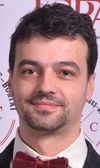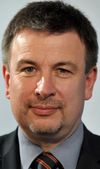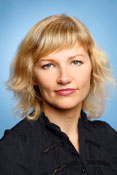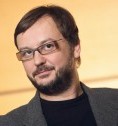| WG_News :: About WG :: Coordinators :: Activities :: WG_outputs |
- Robert Krimmer, Tallinn University of Technology, Tallinn, Estonia; Robert.Krimmer@ttu.ee
 Robert
Krimmer is Full Professor of e-Governance within Ragnar Nurkse
Department of Innovation and Governance at the School of Business and
Governance, Tallinn University of Technology, Estonia. Robert’s research
is focused on the transformation of the public sector, electronic
participation and democracy, as well as e-voting, and all issues
contributing to developing a digital society. Robert is Associate Editor
of the international scientific journal Government Information
Quarterly (GIQ), where he is in charge of participation issues. Further,
Robert coordinates TOOP, the EU H2020 large-scale pilot on exploring
and demonstrating the feasibility of the once-only principle involving
50+ partners from 21 countries inside and outside the European Union. He
was member of the group of experts to the Council of Europe Ad-Hoc
Committee on Electronic Voting (CAHVE) which had the task to update the
CoE's recommendation on legal, technical and operational standards for
Electronic Voting. Also, he was one of the lead experts for the Council
of Europe Ad-Hoc Committee on Electronic Democracy and drafted Annex 1
of the CoE Recommendation (2009) on e-Democracy. Before returning to
academia, Robert was OSCE/ODIHR's first senior adviser on new voting
technologies. In the past he advised CoE, OSCE/ODIHR, UNDP, WHO, ITU,
the European Commission and AWEB on various matters.
Robert
Krimmer is Full Professor of e-Governance within Ragnar Nurkse
Department of Innovation and Governance at the School of Business and
Governance, Tallinn University of Technology, Estonia. Robert’s research
is focused on the transformation of the public sector, electronic
participation and democracy, as well as e-voting, and all issues
contributing to developing a digital society. Robert is Associate Editor
of the international scientific journal Government Information
Quarterly (GIQ), where he is in charge of participation issues. Further,
Robert coordinates TOOP, the EU H2020 large-scale pilot on exploring
and demonstrating the feasibility of the once-only principle involving
50+ partners from 21 countries inside and outside the European Union. He
was member of the group of experts to the Council of Europe Ad-Hoc
Committee on Electronic Voting (CAHVE) which had the task to update the
CoE's recommendation on legal, technical and operational standards for
Electronic Voting. Also, he was one of the lead experts for the Council
of Europe Ad-Hoc Committee on Electronic Democracy and drafted Annex 1
of the CoE Recommendation (2009) on e-Democracy. Before returning to
academia, Robert was OSCE/ODIHR's first senior adviser on new voting
technologies. In the past he advised CoE, OSCE/ODIHR, UNDP, WHO, ITU,
the European Commission and AWEB on various matters. - Nicolae Urs, Babeș-Bolyai University, Cluj-Napoca, Romania; urs@fspac.ro
 olae
Urs, a vice-dean of the college, is interested in everything related to
technology. More specifically, he has been studying and researching the
way in which public institutions employ new technologies, the changes
that the new social networks brought about in communication, the
opportunities provided by "big data" and the way in which visualising
statistical data can help decelerate social trends. He has a PhD in
online communication, to which he added an internship in the United
States. He teaches courses related to e-Government, to the use of new
technologies, and to online communication. He is actively involved in
public institutions' digitization projects, both at the level of the
city of Cluj-Napoca, as well as at a national level.
olae
Urs, a vice-dean of the college, is interested in everything related to
technology. More specifically, he has been studying and researching the
way in which public institutions employ new technologies, the changes
that the new social networks brought about in communication, the
opportunities provided by "big data" and the way in which visualising
statistical data can help decelerate social trends. He has a PhD in
online communication, to which he added an internship in the United
States. He teaches courses related to e-Government, to the use of new
technologies, and to online communication. He is actively involved in
public institutions' digitization projects, both at the level of the
city of Cluj-Napoca, as well as at a national level. E-mail: tina.jukic@fu.uni-lj.si
Andras Nemeslaki, National University of Public Service, Budapest, Hungary
E-mail: nemeslaki.andras@uni-nke.hu
Kristina Reinsalu, e-Governance Academy, Tallinn, Estonia
E-mail: kristina@ega.ee
E-mail: tina.jukic@fu.uni-lj.si
Kristina Reinsalu, e-Governance Academy, Tallinn, Estonia
E-mail: kristina@ega.ee
E-mail: Ljupco.Todorovski@fu.uni-lj.si
 Tina Jukic graduated from the
Faculty of Administration, University of Ljubljana in 2005. In 2007, she
completed her Masters' degree and gained a PhD in Administrative
Science in 2013 at the same faculty. In 2013, she received an award for
outstanding achievements of young university teachers from the Rector of
the University of Ljubljana. She now works as an Assistant Professor of
informatics in Public Administration at the same faculty. She teaches
Informatization of Business Processes in Public Administration,
E-government, Web Marketing and Basics of Informatics. Currently, she is
also Head of Chair of Organisation and Informatics. As a researcher she
is active in the field of e-government; in recent years her research
activities have mainly focused on methodologies for the evaluation of
e-government policies, programs and projects and on social media usage
in public administration. She participated in several national and
international research and consulting projects, and is (co-) author of
several scientific and professional publications.
Tina Jukic graduated from the
Faculty of Administration, University of Ljubljana in 2005. In 2007, she
completed her Masters' degree and gained a PhD in Administrative
Science in 2013 at the same faculty. In 2013, she received an award for
outstanding achievements of young university teachers from the Rector of
the University of Ljubljana. She now works as an Assistant Professor of
informatics in Public Administration at the same faculty. She teaches
Informatization of Business Processes in Public Administration,
E-government, Web Marketing and Basics of Informatics. Currently, she is
also Head of Chair of Organisation and Informatics. As a researcher she
is active in the field of e-government; in recent years her research
activities have mainly focused on methodologies for the evaluation of
e-government policies, programs and projects and on social media usage
in public administration. She participated in several national and
international research and consulting projects, and is (co-) author of
several scientific and professional publications.
 Andras Nemeslaki graduated from the
Technical University of Budapest and holds a Ph.D. from the Hungarian
Academy of Sciences. He is a Professor of Information Systems and Head
of the E-Government Institute at the National University of Public
Service in Hungary. For 12 years he was the Head of the E-business
Research Group at Corvinus University, and for eight years served as
Associate Dean for International Affairs and the Academic Director of
the CEMS Master in International Management program at Corvinus
University. Professor Nemeslaki is a founding member of the NITIM
(Networks Innovation Technology in Management) international Ph.D.
Consortium which is a unique but widely recognised cross-university and
inter-disciplinary experiment in doctoral education. His field of
expertise and research interest is the organisational use and value of
information communication technologies, ICT innovations in business and
public organisations. He has taught courses at several universities as a
visiting Professor: Case Western Reserve University in Cleveland, Ohio;
University College Dublin; University of Cologne; Bocconi University
Milano and the University of Delaware.
Andras Nemeslaki graduated from the
Technical University of Budapest and holds a Ph.D. from the Hungarian
Academy of Sciences. He is a Professor of Information Systems and Head
of the E-Government Institute at the National University of Public
Service in Hungary. For 12 years he was the Head of the E-business
Research Group at Corvinus University, and for eight years served as
Associate Dean for International Affairs and the Academic Director of
the CEMS Master in International Management program at Corvinus
University. Professor Nemeslaki is a founding member of the NITIM
(Networks Innovation Technology in Management) international Ph.D.
Consortium which is a unique but widely recognised cross-university and
inter-disciplinary experiment in doctoral education. His field of
expertise and research interest is the organisational use and value of
information communication technologies, ICT innovations in business and
public organisations. He has taught courses at several universities as a
visiting Professor: Case Western Reserve University in Cleveland, Ohio;
University College Dublin; University of Cologne; Bocconi University
Milano and the University of Delaware.
 Kristina Reinsalu holds a MPR in Public
Relations and a P.hD. in Media and Communications and is currently
Program Director of Local Governments in Estonian e-Governance Academy. She is
also part-time researcher and lecturer of social communication in Institute of
Media and Communication at University of Tartu. Next to her
teaching she has been involved in several local and international research
projects focused on the use of ICT in communication of public
institutions, focusing especially on e-participation and tools for implementing
it on local level. Her last projects have been Interreg IVC financed project - eCitizen II – Towards citizen-centered eGovernment
in European cities and regions, Estonian Electors Compass 2011 made for Estonian
Parliamentary Elections etc. She has published articles in different
international scientific journals as Journal of Baltic Studies; Information
Polity : An International Journal of Government and Democracy in the
Information Age; Information Technology for Development etc.
Kristina Reinsalu holds a MPR in Public
Relations and a P.hD. in Media and Communications and is currently
Program Director of Local Governments in Estonian e-Governance Academy. She is
also part-time researcher and lecturer of social communication in Institute of
Media and Communication at University of Tartu. Next to her
teaching she has been involved in several local and international research
projects focused on the use of ICT in communication of public
institutions, focusing especially on e-participation and tools for implementing
it on local level. Her last projects have been Interreg IVC financed project - eCitizen II – Towards citizen-centered eGovernment
in European cities and regions, Estonian Electors Compass 2011 made for Estonian
Parliamentary Elections etc. She has published articles in different
international scientific journals as Journal of Baltic Studies; Information
Polity : An International Journal of Government and Democracy in the
Information Age; Information Technology for Development etc.  Ljupco Todorovski is an Associate Professor at Faculty of Administration, University
of Ljubljana, Slovenia. His research is in the field of computer science, more
specifically in artificial intelligence, machine learning, and computational
scientific discovery. His work focuses on capturing and formalizing knowledge
for mathematical modeling of dynamic systems. He develops computational methods
for capturing formal modeling knowledge and integrating it in the process of
inducing models of dynamic systems time-series data about their observed
behavior. He collaborates with scientists in the fields of life sciences and
ecology on applications of the developed methods to various tasks of modeling
aquatic ecosystems and gene regulatory networks
Ljupco Todorovski is an Associate Professor at Faculty of Administration, University
of Ljubljana, Slovenia. His research is in the field of computer science, more
specifically in artificial intelligence, machine learning, and computational
scientific discovery. His work focuses on capturing and formalizing knowledge
for mathematical modeling of dynamic systems. He develops computational methods
for capturing formal modeling knowledge and integrating it in the process of
inducing models of dynamic systems time-series data about their observed
behavior. He collaborates with scientists in the fields of life sciences and
ecology on applications of the developed methods to various tasks of modeling
aquatic ecosystems and gene regulatory networks



 Price:
Price: 








